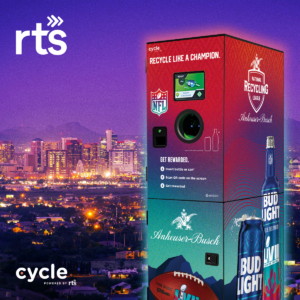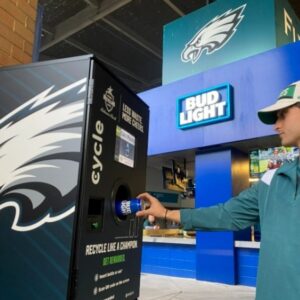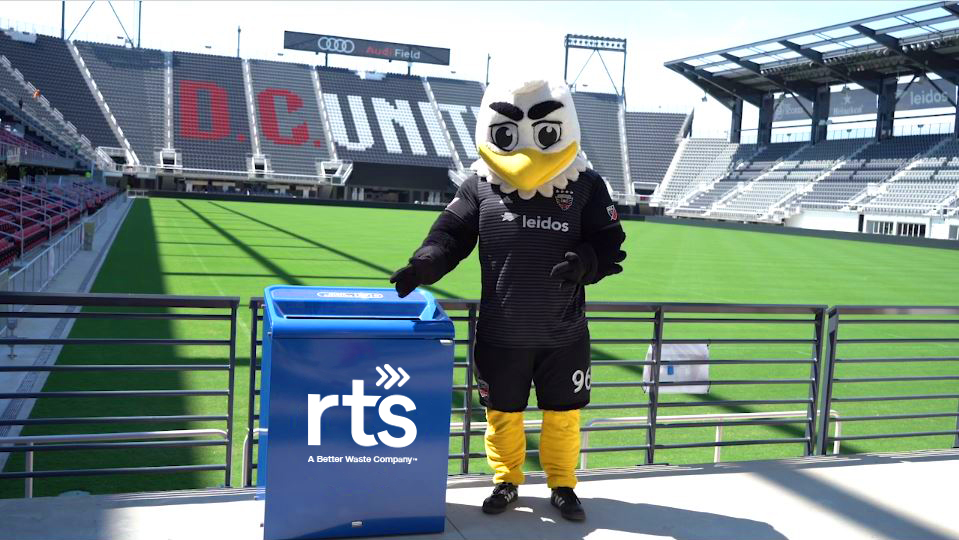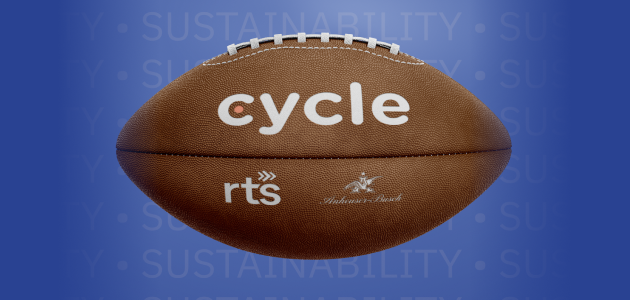RTS Technology to Engage Fans in Sustainability at SB LVII
With the 57th edition of the Super Bowl just around the corner, and around 100 million Americans gearing up for the first big-game meeting between The Philadelphia Eagles and The Kansas City Chiefs, RTS is preparing for a first of its own. Joining forces with one of America’s biggest beer companies, Anheuser-Busch, and building on the narrative of sport as a catalyst for change, RTS is proud to announce that its Cycle Reverse Vending Machine will be available at State Farm Stadium to boost in-game recycling rates and raise awareness around sustainability.
Here then, as kickoff fast approaches, we explore why the Super Bowl is the ideal platform for sustainable thinking and how RTS is making this possible in line with the NFL’s longstanding commitment to reducing its impact and leaving a positive green legacy in communities across the US.
Sustainability At Stadiums — beating waste at the “Big Game”
More people gathered in one place often equals more waste. If the average American produces 4.9 pounds of waste per day, the 63,400-seat capacity of the host stadium for this year’s highly-anticipated Super Bowl LVII likely multiplies that, and then some. The game’s organizers have estimated the average NFL season game generates 80,000 pounds of trash; that can double during the Super Bowl!
Reverse Vending Machines Boost Awareness and Promote Sustainability
As leaders in cutting-edge traceability and sustainability solutions, the RTS Cycle platform is the latest addition to our recycling technology, rewarding customers for recycling beverage containers and transforming the way the public interacts with sustainability. Easy to use yet complex enough to truly optimize recycling systems at sports venues and beyond, the combination of flexible software and intelligent container deposits systems can be tailored to specific use cases, but today, finds itself a part of the State Farm Stadium and NFL’s push to build more sustainable Super Bowl.
Key to this new approach is the “gamification” of material recovery on the consumer end. This means encouraging fans by rewarding them for their part in the recycling process, giving away, for example, free drinks or other prizes such as team jerseys which can be redeemed through the app. As a proven motivation strategy, our gamified RVMs help to boost community engagement and give consumers a tangible reason to proactively recycle.

This follows on from the fact that the Eagles were the first team in the NFL to debut this emerging technology, offering prizes, from autographed items to tickets to next year’s season opener for fans who make use of them at their home games at Lincoln Financial Field.
At Super Bowl LVII, members of the public will purchase Anheuser-Busch drinks at the stadium, then deposit beverage containers like cans, plastic bottles, and cups into our machines. The Cycle machine then compresses the containers, and the touchscreen display prompts fans to complete a questionnaire with a unique transaction ID.
Those who use the machines will find out instantly whether they won and will be given instructions. The recycling machine itself then sorts and crushes bans and bottles automatically, ensuring zero contamination and compact waste storage, as well as monitoring data to understand strengths, weaknesses, and improvements that can be made for future events.
Greg Lettieri, Co-Founder and Chief Executive Officer of RTS, commented:
“There’s few ways better to reach millions of fans to engage them in recycling than through the Super Bowl. Through our Cycle RVMs, RTS has the unique opportunity to engage fans through a physical activation that promotes environmentally conscious practices at the biggest game of the year.”
We hope that this initiative will help to connect consumers directly with circular economy and zero-waste concepts both during and after the game. RTS will collect the crushed cans and bottles from the machines and divert them to the appropriate recycling facilities, while also providing comprehensive waste metrics and reporting, giving the NFL, its partners, and football fans real-world data on how consumers connect with recycling systems, as well as furthering their sustainability goals.
Sporting Events Can Lead the Way
Having successfully implemented a localized deposit return system in collaboration with Heineken and Major League Soccer’s Inter Miami in 2022, collecting 2,800 containers over 1,641 transactions, Cycle technology is well-placed to show how sporting events can lead the way in sustainable thinking. Today, millions of Americans attend sporting events each year, with up to 75% showing calling themselves fans of some sort. Many also participate in sporting events and other recreational activities throughout the country, showing that effective waste management at events and in stadiums can have a major impact on nationwide recycling rates.
This may seem small compared to the number of people in the seats, but this waste data and tracking is essential to bringing premium RVM placement, personnel training, media announcements, and POS space to more stadiums, for more recycling. At one activation at the Inter Miami FC soccer club, winners off the field included fans who recycled through the Reverse Vending Machines, including this lucky fan: “Just excited to win! I never win anything, haha 🙂 Thank you for making my day!” “Win” and “recycle” in the same game? Waste doesn’t stand a chance.
RTS has also recognized the potential for sporting events to be a catalyst for wider change, despite the fact that they are often seen as generators of waste. With programs covering both the Barclays Center and Citi Field in New York, our technology and infrastructure have helped divert thousands of tons of waste away from landfill, giving stadiums and other venues insights into waste generation, load contamination, and how destination facilities deal with waste materials. In addition, events offer a platform to raise the profile of recycling and other sustainability initiatives, providing the opportunity to educate consumers on where waste goes.
Today, in partnership with Anheuser-Busch, we’re proud to add the State Farm Stadium and the Super Bowl to our list of sporting stars, helping the NFL work towards its own sustainability goals with fan-based recycling initiatives that offer a glimpse of the future of waste management.
The Super Bowl is the Ultimate Platform for Sustainability
With the impact of sporting events becoming increasingly part of the conversation around sustainability, Super Bowl LVII has set up a global stage for recycling and beyond. With audiences estimated to be over 200 million viewers worldwide, and the Super Bowl building on its award-winning environmental program, the NFL has laid the groundwork for Sunday’s event to be the ultimate platform for sustainable thinking.
The NFL has long championed sustainability across its calendar of events, and the Super Bowl’s own sustainability program stretches back more than 15 years. Today, with the support of RTS and Anheuser-Busch, the NFL looks to this year’s event to set new standards of event sustainability, with a range of programs that span green energy generation, e-waste collection, material & food recovery, and recycling & solid waste management.

